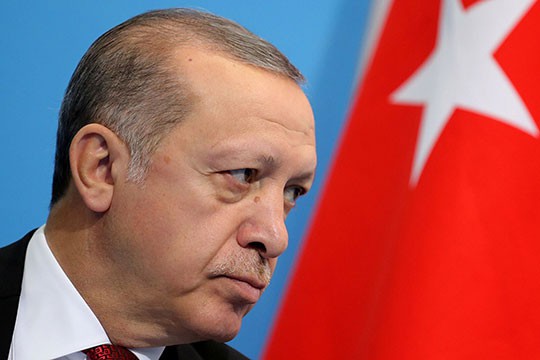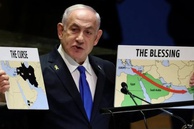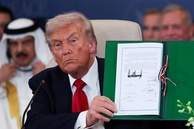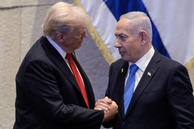The scaling down of the US presence in the Middle East and the possible strengthening of Iran's positions following the lifting of the American sanctions are forcing the leading regional powers to reset their relations with their neighbors. Above all, with Israel, the existential enemy of the Islamic Republic of Iran (IRI), and with Syria, which is trying to offset Tehran's influence on its territory.
Turkey is likewise trying to join the conciliatory trend, though for different reasons. Ankara's hyperactivity within its neo-Ottoman foreign policy paradigm was perceived by the overwhelming majority of Arab countries as a threat to the regional status quo, and Ankara's use of various Islamist organizations, like for example, the Muslim Brotherhood movement (banned in Russia and many Arab countries), has added to the general sense of irritation felt by Arab regimes.
It is not surprising, therefore, that in their ultimatum to Qatar (perhaps Turkey's sole ally in the region), the leading Arab states laid out the conditions for lifting the blockade, which includes a demand to roll up the emirate’s military cooperation with Ankara and the elimination of the Turkish military base in that country. Back in 2018, the foreign minister of the United Arab Emirates (UAE) Anwar Gargash urged the fellow Arab nations to rally against the threat of growing Turkish (and also Iranian) hegemony in the Middle East. Almost simultaneously, Cairo called on the members of the Arab League to work out a consolidated position regarding Ankara’s military campaign in Syria.
Finding itself in regional isolation, exacerbated by growing frictions with the United States and NATO, Turkey was forced to back down and start reconciliation with the three leading states of the region - the Kingdom of Saudi Arabia (KSA), Egypt and the United Arab Emirates, relations with which have during the past few years teetered precariously on the brink of a Cold War, and mutual exchanges of reproaches have usually proceeded in a sharp, if not offensive manner. In addition to "personal" contradictions with Ankara, all these three countries are united by their denunciation of Ankara’s support for the Muslim Brotherhood in Egypt and Libya, as well as Turkish activity in northern Iraq and Syria. Incidentally, the Emirates reopened their embassy in Damascus, Cairo is actively lobbying for bringing Syria back into the Arab League, while Riyadh apparently has no objections to this.
The Saudi-Turkish dialogue resumed at the end of last year, with the Turkish foreign minister visiting Riyadh in May. However, the whole process stalled, even though the Saudis lifted a tacit ban on imports from Turkey.
In late 2020, the Turkish president declared his desire to restore "historical friendship" with Egypt. In addition to ending its political isolation, Turkey, whose foreign economic priority was to become Europe’s energy hub, was clearly counting on the transit of Egyptian natural gas through its pipelines. Although essentially interested in such a prospect, Cairo still has an alternative proposal - overland and sea transit through Israel (relations with which have been normalized for quite some time now), as well as via Cyprus and Greece (with which Cairo has become close, above all on the "gas" basis). This allows the Arab countries to take a measured approach to doing business with Turkey.
"If we see real steps being made by Turkey to stabilize the situation in the region in parallel with the actions of Egypt, then this can become the basis for a normalization of relations," the Egyptian foreign minister stated, [i] fully in line with the old joke, which says that "... if a diplomat says 'maybe', it means 'no'."
Ankara views relations with the UAE with greater optimism though. In November, Recep Tayyip Erdogan was playing host to the Emirates’ de facto ruler, the Crown Prince of Abu Dhabi Sheikh Mohammed bin Zayed Al Nahyan. During the talks, the two discussed multi-billion dollar Emirati investments in the Turkish economy, as well as the political situation in the Middle East. After the talks, the Turkish leader even rushed to announce the dawn of a "new era" in bilateral relations.
Nobody talks about a "new era" in relations with Israel though. The leaders of the two countries only recently started calling each other, with Erdogan, arguing during one such telephone linkup that "Turkish-Israeli relations are important to security and stability in the Middle East," and that "disagreements can be minimized if mutual understanding is shown on bilateral and regional issues.” [ii]
In order to stimulate dialogue, Turkey even staged an "incident" by arresting for alleged espionage Israeli tourists who were photographing one of Ankara's main attractions, the new presidential palace. They were released shortly afterwards and the Israeli president thanked his Turkish counterpart (also by phone) for his “humane” decision.
According to various media reports, the two countries are now preparing to exchange ambassadors (following Donald Trump's decision to recognize Jerusalem as the capital of Israel and the Israeli security forces’ crackdown on Palestinian protests, Turkey and Israel recalled their ambassadors).
The recent developments in Turkish-Iranian relations are an example of how growing tensions can be eased with the help of diplomacy.
These relationships are a complex mosaic of cooperation and conflict. The two countries have been competing for influence in the Middle East (primarily in Iraq and Syria) for more than a century now, and this hardly contributes to strengthening mutual trust.
Moreover, Turkey remains a member of NATO and, despite a series of mutual reproaches, an ally of the United States - the "Great Satan” as the Iranian authorities call it. In addition, Ankara is trying to reconcile with Israel and Saudi Arabia, which is not making Tehran happy either, just as Turkey's active penetration into Syria, Trans-Caucasus and Central Asia under slogans that can be interpreted as promoting pan-Turkism. Only recently, this complicated process led to the display of full combat readiness of the Iranian and Turkish armed forces in Nagorno-Karabakh.
However, much to the surprise of many observers, on November 15, 2021, the Iranian foreign minister, emerging from talks with his Turkish counterpart, said that the parties had agreed to adopt a roadmap for long-term cooperation during Recep Tayyip Erdogan’s upcoming visit to Iran in December.
The Turkish leadership believes that now that it has won partners in the Arab world and has seen the end of its regional isolation, this would give it greater popular support inside the country and add to its political weight in the eyes of the world's leading actors, above all the United States, relations with which have been going downhill for a long time now.
Meanwhile, the situation does not look particularly good for Ankara, with most experts skeptical about reconciliation with the Arab countries, arguing that the process will end not with the establishment of allied or even partnership relations, but only with a temporary truce in the conflict between Turkey and the Arab countries. The situation has changed: even the Palestinian problem, which Erdogan tried to use to gain prestige in the Arab capitals, has lost much of its relevance now that we see the Americans, Arabs and Israelis holding joint military exercises.
In a bid to mend fences with Israel, Ankara, given the geopolitical role of the Jewish state, is apparently hoping to get chummy with the United States. Transportation of Israeli natural gas is also of considerable interest. For its part, the Jewish state is also ready to normalize ties, but it looks like it is not prepared to go any further.
Turkey and Iran have shared economic interests, with the Turkish market needing Iranian energy resources, and the Islamic Republic feeling a need for Turkish manufactured goods. Besides, both countries are equally wary of the threat of Kurdish nationalism "with a separatist slant."
They also need to "do something about Afghanistan," avoid clashes in Syria. and prove to themselves and to the world their ability to find regional partners.
So far, this has mainly been a process for the sake of process. In order to achieve real results, Ankara will obviously have to revise a number of its paradigmatic attitudes in foreign policy. However, doing this will prove an extremely hard task for the current Turkish leadership, which has spent a lot of effort building the country’s current political image.
The views of the author are his own and may differ from the position of the Editorial Board.
------------------------------------------------------------------------------------
[i] Turkey and Egypt embark on a course of reconciliation/ expert.ru (March 18 2021)
[ii] İsrail Başbakanı′ndan Erdoğan′a teşekkür telefonu | Türkiye | DW | 18.11.2021
read more in our Telegram-channel https://t.me/The_International_Affairs

 18:25 20.12.2021 •
18:25 20.12.2021 •



























